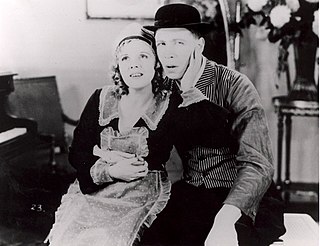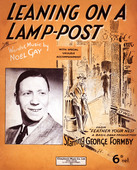Related Research Articles

George Formby, was an English actor, singer-songwriter and comedian who became known to a worldwide audience through his films of the 1930s and 1940s. On stage, screen and record he sang light, comical songs, usually playing the ukulele or banjolele, and became the UK's highest-paid entertainer.

Beryl Ingham was the wife and manager of singer/actor George Formby, as well as being a variety performer and champion clogdancer.

Wigan Pier is an area around the Leeds and Liverpool Canal in Wigan, Greater Manchester, England, south-west of the town centre. The name has humorous or ironic connotations since it conjures an image of a seaside pleasure pier, whereas Wigan is in fact an inland and traditionally industrial town.

No Limit is a 1935 British musical comedy starring George Formby and Florence Desmond. The film, which was directed by Monty Banks, was made on location at the TT motorcycle race on the Isle of Man. It was the first of eleven films that Formby made with Associated Talking Pictures.

George Formby was an English comedian and singer in musical theatre, known as one of the greatest music hall performers of the early 20th century. His comedy played upon Lancashire stereotypes, and he was popular around Britain. His nickname, "The Wigan Nightingale", was coined because of the way he would use his bronchial cough as a comedic device in his act.

Wigan is a large town in Greater Manchester, England, on the River Douglas. The town is midway between the two cities of Manchester, 16 miles (25.7 km) to the south east, and Liverpool, 17 miles (27 km) to the southwest. The towns of Bolton to the northeast, and Warrington to the south are 10 miles (16 km) and 12 miles (19 km) away respectively. Within the boundaries of the historic county of Lancashire, Wigan is the largest settlement in the Metropolitan Borough of Wigan and its administrative centre. The town has a population of 103,608, and the wider borough of 318,100.

"When I'm Cleaning Windows" is a comedy song performed by Lancastrian comic, actor and ukulele player George Formby. It first appeared in the 1936 film Keep Your Seats, Please. The song was credited as written by Formby, Harry Gifford and Fred E. Cliffe. Formby performed the song in A♭ in Keep Your Seats, Please. For the single release, the key was changed to B♭.

Spare a Copper is a 1940 British black-and-white musical comedy war film directed by John Paddy Carstairs and starring George Formby, Dorothy Hyson and Bernard Lee. It was produced by Associated Talking Pictures. It is also known as Call a Cop. The film features the songs, "I'm the Ukulele Man", "On the Beat", "I Wish I Was Back on the Farm" and "I'm Shy". Beryl Reid makes her film debut in an uncredited role, while Ronald Shiner appears similarly uncredited, in the role of the Piano Mover and Tuner.
Fred Godfrey was the pen name of Llewellyn Williams, a World War I songwriter. He is best known for the songs "Take Me Back to Dear Old Blighty" (1916) and "Bless 'Em All" (1917), a 1940s hit recorded by George Formby that can be found on many war films.

Boots! Boots! is a 1934 British comedy film directed by Bert Tracy and starring George Formby, Beryl Formby, and Arthur Kingsley. It was made by Blakeley's Productions, Ltd. at the Albany Studios in London. The premiere of the film was in Burslem, Stoke-on-Trent.

"Leaning on a Lamp-post" is a popular song written by Noel Gay and best known in the version by George Formby.

Bell-Bottom George is a 1943 black and white British comedy musical film, directed by Marcel Varnel, starring George Formby and Anne Firth. A wartime morale booster, it features the songs, "Swim Little Fish", "It Serves You Right", "If I Had A Girl Like You" and "Bell Bottom George." Future Carry On star Charles Hawtrey appears in a small role.

The English comic, singer and actor George Formby performed in many mediums of light entertainment, including film, radio and theatre. His career spanned from 1915 until December 1960. During that time he became synonymous with playing "a shy, innocent, gauche, accident-prone Lancashire lad".

Off the Dole is a 1935 British film starring George Formby. Formby appeared as John Willie, a stage character originally developed by his father, George Formby, Sr.; Beryl Formby, Formby Jnr's wife, also appeared in the film.
"Delivering the Morning Milk" is a comic song written by George Formby, Harry Gifford and Frederick E. Cliffe. Formby recorded it on 28 July 1941 for Regal Zonophone Records. The song is similar to Formby's signature tune, "The Window Cleaner", only now he now describes the various sights he sees, often of a sexual nature, while out on his milk round.

"The Emperor of Lancashire" is a 1941 comic song written by Roger MacDougall for the British comedian George Formby. In it Formby boastfully proclaims about his future success that will one day make him Emperor of the English county of Lancashire. It is filled with a number of references to Lancashire dialect and culture.
"Under the Blasted Oak" is a comic song written by George Formby and Frederick E. Cliffe. Formby recorded it on 11 October 1942 for Regal Zonophone Records. It tells a humorous "ghost story" about the attempts of Formby and his girlfriend to find a buried stash of money, hidden by a miser under a blasted Oak Tree. The miser makes an apparently ghostly appearance, only to turn out to be wearing a bed sheet.
"It Serves You Right" is a 1943 British comic song associated with the British comedian George Formby. The song features a sailor in the Royal Navy lamenting the downsides of service life. Despite this the tone of the song is cheerful and upbeat.

"Chinese Laundry Blues" is a 1932 comic song written by Jack Cotterill and associated with the British comedian George Formby. Formby recorded it for Decca Records on 1 July 1932. The song takes place in Limehouse where the owner of a laundry has fallen in love, and is no longer paying attention to his job. It subtly uses the Oriental riff.
Thomas Widdicombe, who wrote under the name T. W. Connor, was an English writer of popular songs and monologues for music hall performers in the late 19th and early 20th centuries.
References
- ↑ Richards p. 194
Bibliography
- Richards, Jeffrey. The Age of the Dream Palace. I.B. Tauris, 2010.